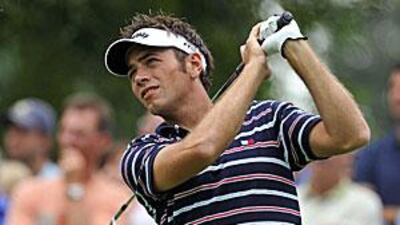Nick Dougherty will go on to win more important events than the BMW International, but his victory in Munich last weekend could prove to be the turning point in a career which has always promised great things. When he turned professional in 2001, after helping Great Britain and Ireland defeat the US in the Walker Cup, it seemed that the then 19-year-old Englishman had the golfing world at his feet.
A protege of Nick Faldo, Britain's most successful golfer, he had enjoyed an outstanding amateur career, winning the World Boys Championship in 1999. In his first season on the European Tour in 2002, he finished 36th on the Order of Merit and was the "Sir Henry Cotton Rookie of the Year". It was a promising start, although life on Tour since then has been something of a roller-coaster ride for Dougherty and I hope he has now reached a levelling off point and can go on to achieve the success he is capable of.
He is a Ryder Cup player and major winner in waiting, and he picked the perfect time on Sunday to remind us of his powers, with the Open Championship just around the corner. His eight-under-par 64 was the lowest final round to win a European Tour event this year and his 22-under-par total also the lowest so far this season. He overhauled two major winners in playing partners Retief Goosen and Bernhard Langer, and just as impressive was the way he held his nerve on the dangerous par five final hole after Rafa Echenique's albatross two there had threatened to drag him into a play-off.
Afterwards Dougherty said that, while he has never had trouble piling up the birdies, he must work harder at cutting out the bogeys, and I sense there is a maturity about him now which will allow him to do that, and realise his full potential. While his win in Germany sent him 56 places up the world rankings he is still at No 64, a relatively modest position for a player with top 10 ability, and although he often makes the game look easy, it has not always been that way.
He was hit hard by glandular fever in 2003 and there were various ups and downs before his world was shattered last year when his mother died suddenly. In the early part of his professional career Dougherty earned a reputation as the party boy of the European Tour and was nicknamed "Georgie" by the caddies, after legendary footballer George Best, because of his fun-loving lifestyle. He was a young man with plenty of money enjoying life to the full, and for a time, as he now acknowledges, golf took a back seat to some extent and his game suffered.
When the penny dropped around three years ago, Dougherty re-dedicated himself to the game, began to work tremendously hard on his swing and started to find some form. But in my opinion he overdid the technical work, putting too much emphasis on technique to the point where he basically forgot how to play golf with the natural flair and talent that had made him such an outstanding player. It is difficult taking a driving range game on to the golf course. You're left with little or no creativity or rhythm, and none of the touch and feel that you need to win tournaments.
His natural talent was being stifled. His conscious mind was too much in control. While technique is vital, a golf swing cannot be this mechanical. The subconscious mind does a lot of the hard work for you, and I believe this dawned on Nick Dougherty last winter. He has since focused on getting some feel back into his golf, and while it is early days yet, his third Tour win in Munich last weekend suggests that there is plenty more to come, and if he can get it all together he could be a world-beater.
If Dougherty needed any reminding about the level of dedication needed to succeed in golf, he had the perfect playing partner in Langer last Sunday. The evergreen German, now 51 but still fit as a fiddle and playing to a very high standard, was lying second behind Goosen going into the final round and was bidding to become the oldest winner on the European Tour, with four years to spare. While he eventually finished tied for ninth place it was a great performance from Langer who is thoroughly enjoying life on the Champions Tour in the US where he leads the money list again after topping it last year.
Meanwhile, another Tour veteran, Kenny Perry, was at it again in the States, winning the Travellers' Championship on Sunday to move to No 4 in the world rankings at the age of 48. It was his 14th win on the PGA Tour, and remarkably 11 of those wins have come since he turned 40. Perry has set himself a target of 20 victories on Tour, showing that it's never too late to be ambitious. Five of his wins have come in the last 13 months, and while he let slip the chance to become the oldest winner of a major at Augusta in April, bogeying the last two holes and eventually losing the Masters play-off to Angel Cabrera, he hasn't given up on that record.
It's an exciting time for golf, with the Open de France starting today followed by the prestigious Scottish Open at Loch Lomond before the Open Championship returns to Turnberry. On the other side of the Atlantic, the AT&T National gets underway at the Congressional Country Club, just outside Washington, with one of the strongest fields of the year lined up and Tiger Woods following in the footsteps of Byron Nelson, Ben Hogan, Arnold Palmer, and Jack Nicklaus in hosting his own tournament. There is much to look forward to.
pparkin@thenational.ae

